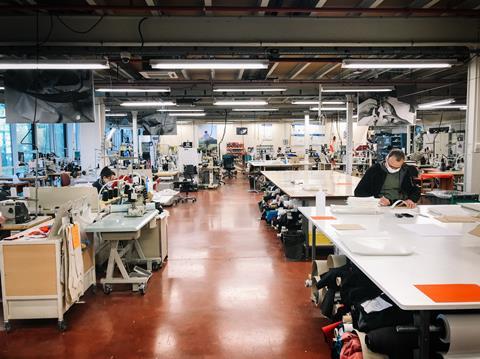As the Covid-19 pandemic continues to paralyze large parts of the outdoor industry, the Compass receives several press releases each week from brands that have converted their productions or source capacities for production of the highly sought-after face masks and medical gowns. Here is the latest news of outdoor companies joining the circle of brands producing gear to fight the spreading of the virus.
The Canadian outdoor brand Arc’teryx, part of the Amer Group which, again, is owned by Anta Sports, has collaborated with industry partners to develop an approved medical gown for healthcare workers. The pattern, design and technical specifications of the gown can be accessed by any manufacturer worldwide through the website of the British Columbia Apparel and Gear Association. Five hundred medical gowns were already delivered to hospitals, and Arc’teryx plans to manufacture up to 30,000 in the coming weeks. According to the company, the combined efforts of Arc’teryx and local manufacturing partners Mustang Survival and Boardroom Clothing will result in 90,000 medical gowns being delivered to hospitals in and around Vancouver, Canada.
La Sportiva introduced the Stratos mask, a hygienic and protective mask that is suitable for athletic activities. For the time being, the Stratos is defined as a “hygienic mask for generic protection,” as the company will only evaluate whether or not to apply for health certification at a later stage. As such, it is designed to offer generic protection and suitable for sports. The mask is made of fabric and has an integrated, replaceable filter. It is washable and reusable. The first prototypes were made using technical fabrics also used for the brand’s apparel.
Odlo has recently switched its production site in Portugal to the development and manufacture of face masks. The certification of the quick-drying masks made of polyester with a non-woven insert made of polyamide/polyester is still pending but expected to happen soon. The masks are antibacterial, Oeko-Tex certified, free of harmful substances, and they can be washed up to 50 times. Odlo will supply medical institutions, hospitals, care facilities and mobile services. Private users can order the masks from the beginning of May on Odlo’s online store.
Salomon started manufacturing reusable face masks at its prototype center in Annecy in the French Alps. The goal is to deliver 90,000 masks from April until June. Faced with the shortage of protective masks, the French government launched a national appeal to its textile industry. Chamatex, a long-time technology partner of Salomon, offered to produce a washable and reusable textile multilayer mask that could be used by administrative and industrial groups and companies in all sectors of the business community. Soon after starting the production, Chamatex called upon Salomon for support, and the outdoor specialist did not hesitate to activate its team of prototype specialists to start production immediately.
Protective, a bike apparel company from the south of Germany, has recently delivered eight million medical masks to the federal state of Bavaria. Michael Bogner, chief executive officer of the brand, had initiated the delivery. Protective decided to change its sourcing capacities with priority to face masks at the end of January. Quality standards for the medical certificates were met together with local suppliers in China, which started to produce the medical masks as soon as the shutdown in China was lifted. The next shipment of another eight million face masks is expected to arrive at the Frankfurt airport soon.
Skylotec, a specialist brand from Germany for personal fall protection equipment such as harnesses, ropes, carabiners and other rescue gear, announced the production of simple face masks protecting mouth and nose made of cotton at its production site in Neuwied, Germany. The masks are intended for personal use as well as for hospital or nursing staff. The production is based on the guidelines for the manufacture of medical equipment that the EU Commission recently published. If necessary, production can be expanded to the company’s facility in Hungary. The masks will initially not be available for individuals, but health authorities and government offices only. Local authorities will be responsible for the distribution. Skylotec might also start the production of FFP2 masks. Skylotec is supported by UltraMedic, a certified manufacturer of medical products, which is part of the Skylotec group. However, material procurement is becoming a challenge, as the raw materials are predominantly manufactured in Asia. Skylotec is currently examining the use of alternative materials.
Direct Alpine, a Czech outdoor brand, also switched its production in the Czech Republic to protective masks made of cotton, intended for personal use and with up to 90 percent of the masks to be distributed in the company’s home market. The masks are available in one size, four different colors, and they fit children age five and up as well as adults.








